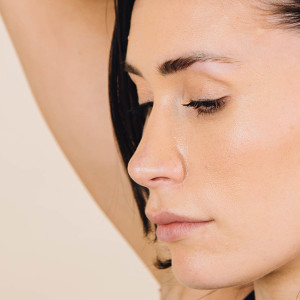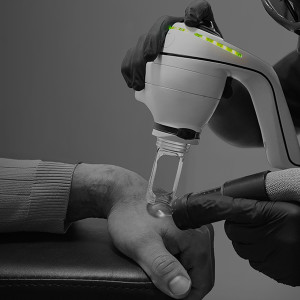
We sat down with tattoo artist Terrie Karam to learn more about tattoo ink and what you should know before you head to your tattoo appointment.
There are a lot of things to consider when getting a tattoo from the studio to the artist and design. But one thing many people might not have on their list is checking in with the type of ink used.
It's important to know about tattoo ink before getting a tattoo because it’s a key component of the tattooing process and can have a significant impact on the quality and appearance of the tattoo.
The ink is used to create the permanent design on the skin, and the type of ink and the way it is applied can affect the color, vibrancy, and longevity of the tattoo. Certain ingredients in tattoo ink can cause allergic reactions or other skin irritation, so it's important to be aware of what is in the ink and how it may affect your skin.
Here’s everything you need to know.
What is tattoo ink made from?
Tattoo ink is usually made from one part pigment and one part carrier solution to create permanent tattoos on the skin. The ink is injected into the dermis layer of the skin using a tattoo needle. The ink can be made up of a variety of different ingredients that ensure the colour lasts in the skin over the years to come, including:
Pigments: The primary ingredient in tattoo ink is pigment, which is what gives the tattoo its color. Pigments can be derived from a variety of sources, including vegetables, minerals (heavy metals), and synthetic materials.
Carrier agents: In order to properly disperse the pigment within the skin, tattoo ink also contains carrier agents. These agents help to suspend the pigment in the ink and make it easier to apply to the skin. Common carrier agents include water, glycerin, and alcohol.
Preservatives: Some tattoo inks may also contain preservatives to help prevent the growth of bacteria and other contaminants. These preservatives help to keep the ink fresh and prevent infections.
Stabilizers: Some inks may include stabilizers to help maintain the consistency of the ink and prevent it from separating or fading over time.
The specific ingredients in tattoo ink can vary from one brand to another, and some inks may contain additional ingredients or differ in their proportions to create their own proprietary blends.
Artists often have their favorites depending on what their style is and what they’re aiming to achieve.
Talk to one of our experts to start your removal journey
Is tattoo ink regulated?
According to John Swierk, assistant professor at Binghamton University, who has studied the composition of tattoo inks and created an online resource to better protect consumers, there is still work to be done.
"Labeling laws are changing, at least in the US. So, there's a chance that a website like whatsinmyink.com might not be needed in a couple of years - but we're not there yet."
Regulations in the EU and UK are stricter when it comes to the composition of tattoo inks and labeling.

What are the best tattoo inks to look for?
Urban Retreat’s tattoo artist in residence Terrie Karam is a big fan of using “vegan vegetable inks made from plant-derived ingredients” in her tattoos. And these days, vegan tattoo inks often have high-quality color payoff and provide good results, even without the use of animal by-products to preserve the pigments. These inks don’t contain any animal-derived ingredients such as:
Bone char
Shellac
Glycerin derived from animal fat
Instead, they’re often made from:
Vegetable-based pigments such as beetroot, carrots, and spinach
Synthetic pigments such as iron oxide and titanium dioxide
Natural oils such as coconut oil, sunflower oil, and grapeseed oil
Plant-based gums and resins such as xanthan gum and acacia gum
Synthetic polymers, such as polyethylene glycol and polyvinyl alcohol
If you’re vegan, you might also want to look for a brand that doesn’t test on animals and is vegan-certified. More and more tattoo artists and studios offer vegan tattoo ink as an option for those who prefer it.
Her favorite vegan ink brand?
Solid Ink, made from a custom blend of natural pigments, distilled water, hamamelis (witch hazel) and vegetable glycerin, is one of the top brands she recommends. It’s vegan, cruelty-free and non-toxic and comes in a variety of vibrant colors.

Terrie specialises in fine-line tattoos and uses top-of-the-line vegan inks.

What inks to avoid
Plastic inks
These are often made with a heat-resistant plastic found in appliances, luggage and pipes called Acrylonitrile Butadiene Styrene (ABS) to intensify color. The chemical ingredients can make this ink prone to reaction once in the body.
Glow-in-the-dark inks
These are inks that are designed to respond to ultraviolet lights and give off a glow. They’re become more trendy lately, but often have chemical and potentially radioactive ingredients with unknown long-term effects.
Can I get an allergic reaction to tattoo ink?
Yes, it is possible to have an allergic reaction to tattoo ink. Some people may be allergic to one or more of the ingredients in the ink, while others may develop an allergic reaction over time.
Here are some possible causes of an allergic reaction to tattoo ink:
Allergic reaction to the pigment: Some people may be allergic to certain pigments used in tattoo ink, such as certain colors or types of dyes. This can cause an allergic reaction that presents as redness, itching, or swelling at the tattoo site.
Allergic reaction to the carrier agent: The carrier agent in tattoo ink is used to suspend the pigment and make it easier to apply to the skin. Some people may be allergic to one or more of the ingredients in the carrier agent, such as water, glycerin, or alcohol.
Allergic reaction to the preservatives: If the tattoo ink contains preservatives, it is possible for some people to have an allergic reaction to these ingredients. Preservatives are added to the ink to help prevent the growth of bacteria and other contaminants, but some people may be sensitive to these ingredients.
Allergic reaction to the stabilizers: Some tattoo inks may contain stabilizers to help maintain the consistency of the ink and prevent it from separating or fading over time. It is possible for some people to have an allergic reaction to these ingredients.
It's important to note that allergic reactions to tattoo ink are relatively rare, but they can occur. If you are considering getting a tattoo and have a history of allergies or sensitive skin, it may be a good idea to discuss this with your tattoo artist and potentially do a patch test with a small amount of ink before getting a larger tattoo.
If you've had a reaction to the ink, the best thing to do is to get it removed as soon as the tattoo is healed. We recommend using laser tattoo removal, specifically the LightSense®. It's the world’s most effective laser tattoo removal technology that doesn’t damage the skin, and it's only available at NAAMA. To learn more, request a callback with one of our experts here.
Takeaways
If you’re getting ready for a tattoo, here’s some things to keep in mind when it comes to tattoo ink:
- Tattoo ink stays for a long time in the body, so your best bet is to choose the cleanest option you can find. Non-toxic inks made from vegetables are a great option without sacrificing on color payoff
- If you’re vegan, ask your studio and artist if they carry vegan-friendly inks ahead of your appointment
- If you have any known allergies, let your artist know ahead of your session to help rule out chances of a potential reaction to inks
Happy tattooing!
For trends in breakthrough laser tattoo removal technology, here are NAAMA's top laser FAQs.
What is the best laser for tattoo removal?
What is the newest laser technology for tattoo removal?








